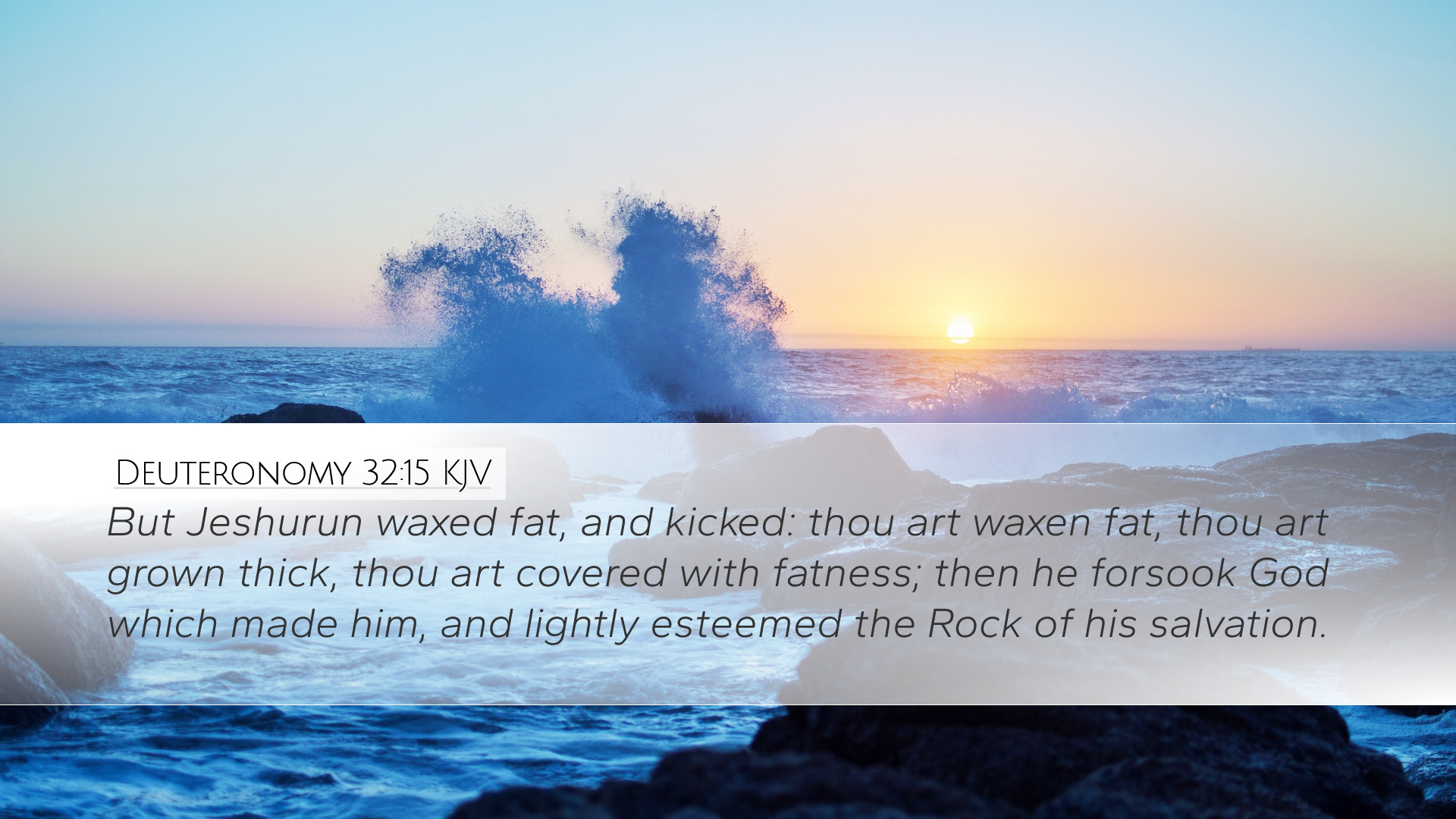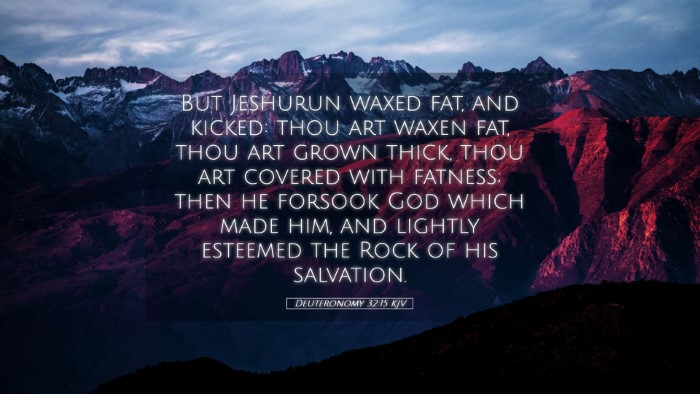Commentary on Deuteronomy 32:15
Verse Text: "But Jeshurun grew fat and kicked; you grew thick, stout, and sleek. Then he forsook God who made him and scoffed at the Rock of his salvation." (Deuteronomy 32:15, ESV)
Introduction
The verse Deuteronomy 32:15 appears in a song, known as the Song of Moses, where Moses recalls the history of Israel and its covenant relationship with God. This commentary draws from public domain commentaries by Matthew Henry, Albert Barnes, and Adam Clarke to provide insights into the significance and implications of this verse.
Contextual Overview
Deuteronomy 32 is a reflective passage that looks back at the relationship between God and Israel, emphasizing the covenant, God's deliverance, and Israel's unfaithfulness. The term "Jeshurun," a name for Israel, means "the upright one," but it ironically contrasts with the behavior described in this verse.
Key Themes
- Spiritual Decline: Jeshurun represents the complacency and pride of Israel that leads to spiritual decline.
- Divine Provision: The reference to being "fat" implies that God gave abundance, which led to self-sufficiency and rejection of dependence on Him.
- Apostasy: The forsaking of God, the "Rock of Salvation," highlights Israel's tendency to turn away from the Lord after experiencing His blessings.
Commentary Insights
Matthew Henry's Perspective
Matthew Henry emphasizes the irony of Israel, named Jeshurun, growing fat and kicking against God. He notes that prosperity often leads to pride and a yielding to temptations of the flesh, which can distance one from God. Henry illustrates this by paralleling Israel's material blessings with their spiritual shortcomings.
He warns that the more one is blessed, the larger the risk of forsaking the Giver of those blessings. This reflects a universal truth about human nature, as entitlement can lead to rebellion and a lack of gratitude.
Albert Barnes' Observations
Albert Barnes elaborates on the metaphor of Jeshurun growing fat and becoming "stout and sleek." He suggests this imagery indicates a state of comfort and complacency that leads to moral and spiritual decay. The 'kicking' denotes a rejection of authority and a resistance to submission to God’s will.
Barnes further explains that the phrase "forsook God who made him" reveals a fundamental tragedy—the Creator is abandoned by His own creation. He underscores that such apostasy brings dire consequences, emphasizing the need to remain vigilant in faithfulness.
Adam Clarke’s Interpretation
Adam Clarke provides a robust linguistic analysis, suggesting the Hebrew terms carry strong connotations of rebellion and obstinacy. He notes that the phrase 'kicked' reflects a rebellious spirit against God's statutes. Clarke connects this passage to the broader narrative of Israel's history of forgetfulness and rebellion against the covenant.
Clarke also points out the theological implications of forsaking "the Rock of his salvation," which is a metaphor for God. In rejecting God, Israel not only disavows their Divine protector but also places themselves in a vulnerable position.
Theological Reflections
The intertwining of blessing and spiritual decline presents a cautionary message for contemporary believers. The history of Israel serves as a mirror for the church today—a reminder that the abundance of God's providence should lead to worship and dependence, not to pride and rebellion. Pastors and theologians should heed this message in their teachings and shepherding.
Applications for Modern Faith
- Recognizing the Source of Our Blessings: Believers are encouraged to consistently acknowledge God as the source of all good things in their lives.
- The Danger of Complacency: Avoiding spiritual apathy requires intentional efforts in prayer, study of the Word, and community with fellow believers.
- Commitment to God’s Will: When faced with blessings, it is vital to remain submissive to God’s sovereignty rather than become self-reliant.
Conclusion
Deuteronomy 32:15 serves as both a historical reflection and a prophetic warning. As lessons from the past are applied to present contexts, it becomes clear that vigilance is essential. This verse challenges each generation to guard against the perils of prosperity leading to forgetting God, encouraging a continuous posture of humility and gratitude.


